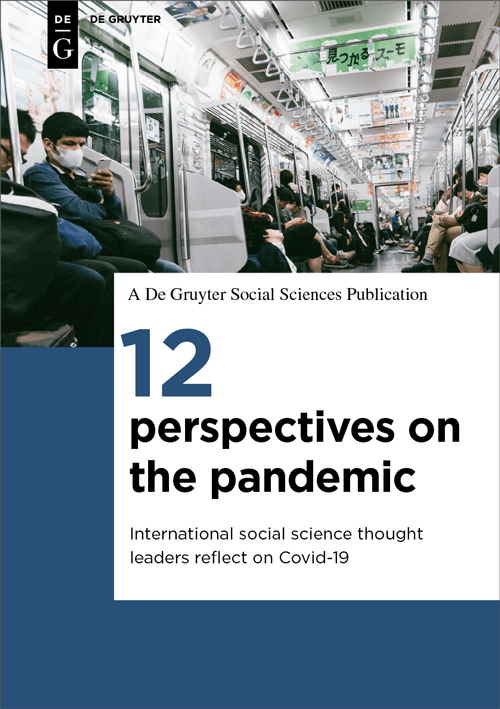Covid-19 and the Civilizing Process
What are the long-term processes within which the emergence of Covid-19 is fixed? Are infectious diseases a central feature of the civilizing process and how can the form taken by this process help to improve control over those diseases?
This essay was first published in the free digital pamphlet 12 Perspectives on
the Pandemic: International Social Science Thought Leaders Reflect on Covid-19.
Three fishermen are caught in a particularly powerful maelstrom. Only one survives: he keeps a cool enough head to notice that smaller, cylindrical objects get sucked down much more slowly, so he lashes himself to a cask and lives to tell the tale. The sociologist Norbert Elias used this short story by Edgar Allen Poe to illustrate the importance of intellectual but also emotional detachment in thinking about the world around us, especially, when things appear threatening.
Pandemics And Long-Term Processes
Elias’s approach to sociology suggests important questions that could help us navigate through the maelstrom that is the Covid-19 pandemic. He is best known for his arguments concerning how human ‘civilization’ should be understood: as a long-term process of ever-lengthening chains of interdependence binding people together in constantly shifting power relations. In that process, the relationships between humans and the non-human environment needs to be seen alongside their relationships with each other, and themselves. He shared the view held by other early sociologists that social relations, structures and processes are closely tied to people’s psychological and emotional dispositions and orientations: their habitus.
“Elias’s approach to sociology suggests important questions that could help navigate through the maelstrom that is the Covid-19 pandemic.”
This approach leads to the following questions. Firstly, what are the long-term processes — in social relations and in relations between humans and the non-human world — within which the emergence of Covid-19 is embedded? Most analyses of pandemics agree that they are closely tied to ongoing processes of change and transformation moving in particular directions. The list of things that are increasing, expanding, intensifying and becoming more complex includes population density, humans’ proximity to each other and to the animal world,and the resistance of carriers of bacteria and viruses to pesticides.
Caught in the Web of Life
A second question would be whether infectious diseases are a central feature of the civilizing process and in what ways can the form taken by this process help to improve control over those diseases? It is precisely increased human control over — read, intrusion into — the non-human world and increasing global interdependence that creates the conditions for the emergence and mutation of bacteria and viruses. Infectious disease has been ‘one of the fundamental parameters and determinants of human history’ (McNeill 1998, p. 295), the greatest single cause of death around the world, killing more individuals than wars, and possibly the most important force behind the impact of colonialism.
With increased control comes increased dependence and vulnerability. As William McNeill wrote in 1997, ‘the way infectious diseases have begun to come back shows that we remain caught in the web of life — permanently and irretrievably — no matter how clever we are at altering what we do not like, or how successful we become at displacing other species’ (p. 17). Clearly similar points can also be made about industrial capitalism, energy consumption and global warming. One could argue that, in the absence of sufficient awareness of this dimension of civilizing processes, it runs the danger of being increasingly vulnerable to catastrophes like pandemics. This then makes control over the natural world itself what needs to be controlled, requiring a form of meta-control or meta-civilizing process.
Transforming Ourselves
Third, what aspects of existing human habitus have contributed to the pandemic, and what changes in habitus might result? Activities like being able to travel the world, attend sporting events and concerts, or visit densely-packed places of worship, restaurants, cinemas, beaches, pubs and cafes, have become central to many people’s sense of being a worthwhile human being. Many parts of the world remain too poor to see themselves this way, but it is an orientation to the world that has been gradually expanding its reach.
Our relationship to the non-human world is closely tied to our relationship to ourselves: as Elias put it, ‘by transforming nature people transform themselves’ (2007 [1987], p. 177). The measures advocated by public health experts require a certain kind of habitus and emotional disposition, a particular transformation of the kind of person we are as well as our relations with others.
Importantly, for Elias — although in relation to public health this idea was most clearly expressed by the Dutch scholar Johan Goudsblom (1986) — the process of civilization has a momentum and force that is independent of the organized response to particular events like pandemics or to other public health problems. Covid-19 needs to be placed in the context of already-existing social structures, dynamics and processes, some of which the pandemic will accelerate or become accentuated over others. From Elias’s perspective, the measures that have been advocated by public health experts since the 1970s, both short- and long-term, ‘stand for’ or ‘represent’ a more generalized capacity for self-restraint, a shaping of habitus in a particular direction that has more to do with the structure and dynamics of social relations more broadly — particularly our relation to the non-human world — than the ‘solution’ to a specific public health problem.
This pandemic appears to be exerting a compulsion to face with sober senses our real conditions of life, and our relations with each other, with varying degrees of success, and engaging with these kinds of questions about the place of the pandemic in the long-term process of civilization provides a useful conceptual springboard for those reflections.
Learn more in this related title from De Gruyter
[Title Image via Getty Images.]
